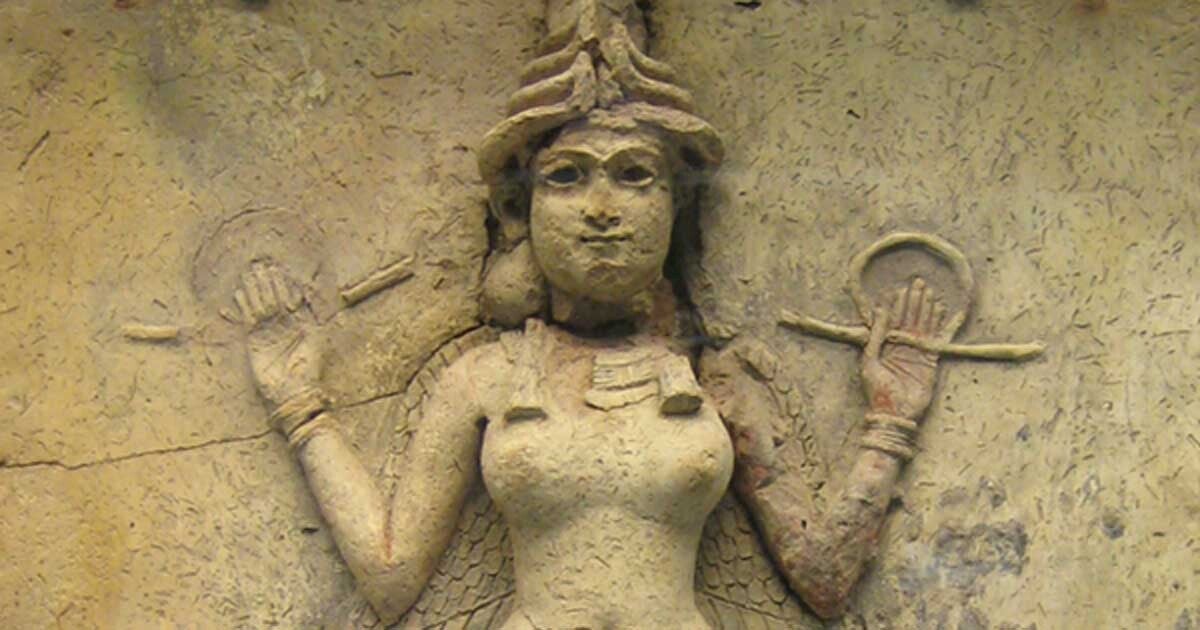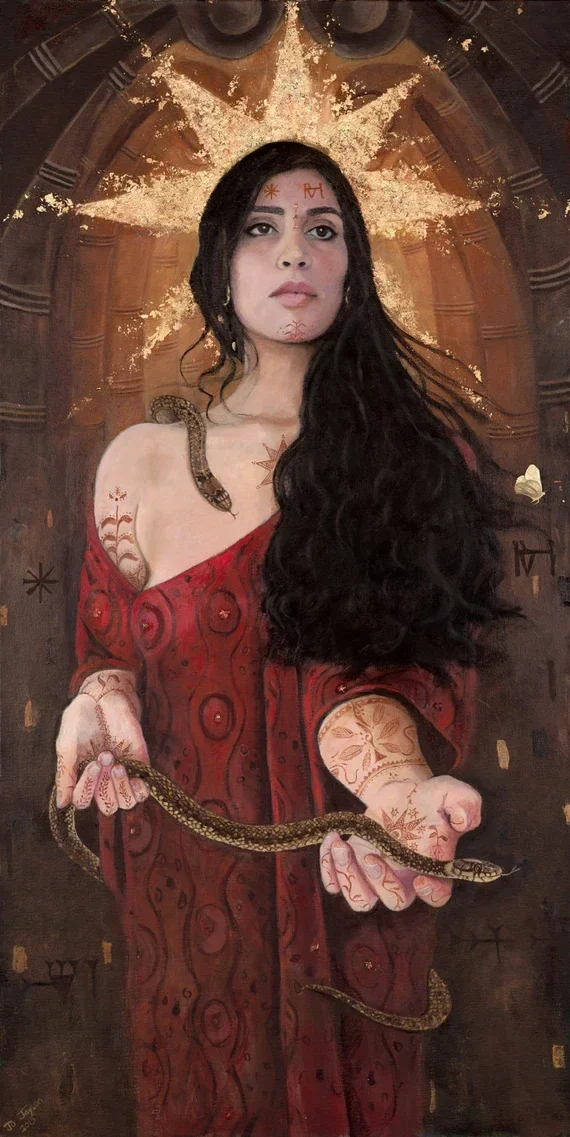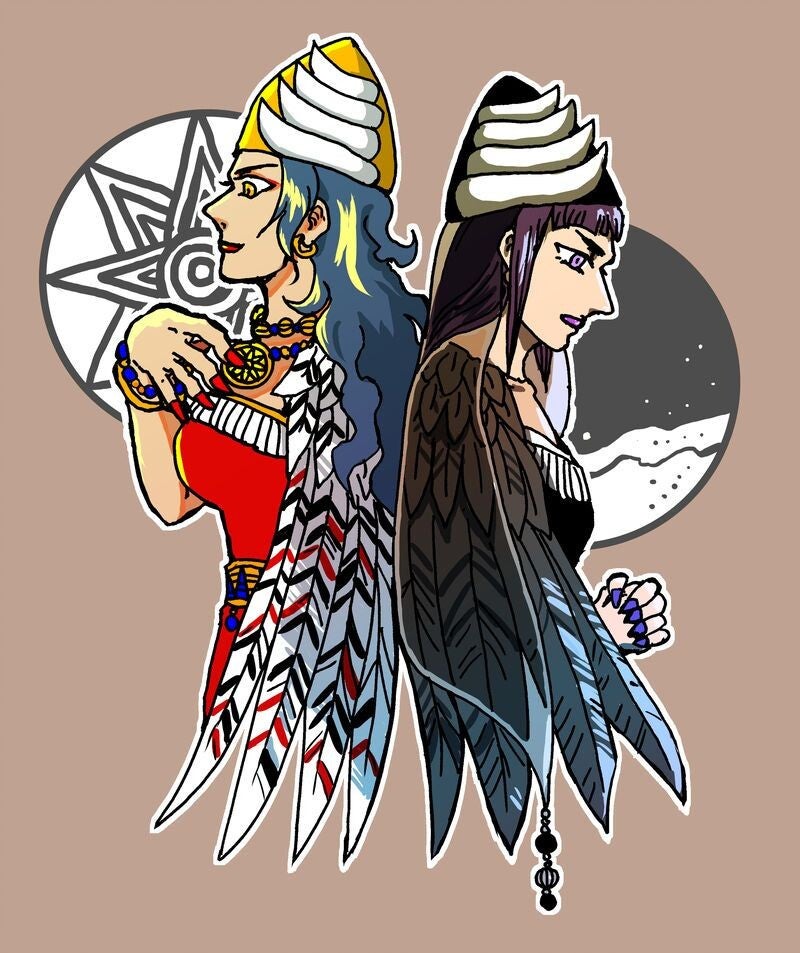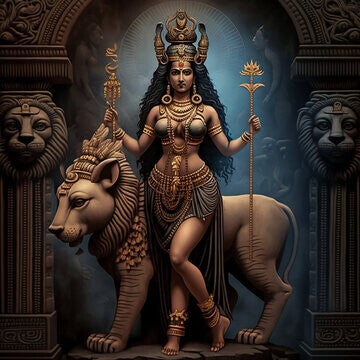
The Descent of Inanna: The God Who Became Human
"Those who remember their divinity must first remember their descent."
The Myth of the Descent
In the age before forgetting, when gods still walked among men, Inanna, Queen of Heaven and Earth, ruled in radiance. She was beauty, sovereignty, and creative force made manifest. Yet even in her divine perfection, a restlessness stirred. Something within her longed to understand the part of herself she could not see, the shadow beneath her own light.

That whisper drew her downward, to the realm of her sister, Ereshkigal, Queen of the Great Below. Inanna did not descend out of curiosity or conquest. She descended out of necessity, the soul’s need to become whole. For even the Gods are incomplete when they remain untouched by their own darkness.
Dressed in her seven sacred adornments - symbols of power, wisdom, and identity - she approached the first gate of the underworld. The gatekeeper, Neti, stopped her and spoke the eternal law:
“To enter, you must be stripped of what you carry.”
At each of the seven gates, Inanna surrendered a piece of herself:
her crown of divinity, her jewels of insight, her robes of authority.
Each surrender brought her closer to the truth she had sought to avoid - that power without humility becomes illusion.

Finally, she stood naked before Ereshkigal, who sat veiled and silent upon her throne of shadow.
The Queen of Below did not bow or greet her.
She condemned her.
“Why have you come to me, sister?”
And in that mirror of accusation, Inanna saw all she had denied: the grief, rage, and abandonment she had cast away in her ascent to heaven. Ereshkigal was not her enemy, but her wound made flesh.
When the shadow was denied, it became monstrous; when embraced, it became medicine.
Yet before the light could understand, it had to die.
Inanna was struck down and hung upon a hook - suspended between worlds.
For three days and nights, she lay lifeless, her radiance extinguished.
Until compassion stirred in the heavens. Enki, god of wisdom, fashioned beings of neither male nor female, and sent them with the waters of life to revive her.
When she rose again, Inanna was no longer a goddess of light alone.
She had touched death, grief, and the stillness that lies beyond form.
Her return was not a victory over darkness, but an integration of it.
As she reclaimed her seven adornments, each now shone with new meaning - no longer symbols of separation, but of unity.
Power now carried compassion. Sovereignty now carried surrender.
The Rite of the Gods
Across cultures, the same truth is whispered through different tongues.
In Egypt, it was said of a pharaoh upon death: “He has done the giving of life.”
In Greece, Demeter descended in grief, and Persephone rose reborn.
In India, Shiva dissolves creation only to birth it anew.
In Sumer, Inanna descended not to lose her power, but to offer it to the cycle of becoming.
The gods, too, must fall into matter, for only through the experience of mortality can they know the fullness of creation.
This is the great paradox of divinity: perfection seeks imperfection to understand itself.
In descending into limitation, the gods remember their boundless nature.
In becoming human, they complete their circle.
When Inanna descended, she performed what all divine beings must eventually enact - the rite of incarnation.
To “give life” is to step into the density of form, to enter time, to feel the ache of separation.
It is to allow the eternal to taste impermanence so that it might know itself more intimately.
The same energy that created the stars now breathes through our lungs.
We are the gods dreaming themselves into being - fragments of Source playing out the eternal question: What am I?

The Human Descent
For those of us walking the mortal path, the myth is not distant history, it is a mirror.
Every human life recapitulates Inanna’s descent.
Each heartbreak, each surrender, each loss is another gate.
We are stripped not by gods, but by experience, and each stripping brings us closer to truth.
The ego is the radiant robe we wear to move through the world. It gives form and function, yet when mistaken for our essence, it becomes our prison.
Beneath the ego lies the shadow, the wounded guardian that protects what is most sacred within us: the inner child, the creator-self - the fragment of God that imagines worlds.
When the ego begins to dissolve, we meet Ereshkigal; the part of us that holds pain, jealousy, shame, and rage.
If we reject her, we remain divided.
If we listen, she reveals what we have forgotten: that she, too, is divine.
She is the womb of rebirth.
The descent, then, is not destruction but remembrance.
It is the journey of realizing that the self we mourn losing was never the true self at all — only a costume worn by the eternal to experience creation.
To die before we die is to awaken.
And to awaken is to remember that we were never victims of life, but offerings to it.
The Spiral of Becoming
Inanna’s myth is not linear, it is cyclical.
Like the motion of the stars, the spiral of galaxies, or the breath of the universe, descent and ascent are eternal partners.
Energy cannot be created or destroyed; it can only transform.
So too does consciousness, spiraling inward to know, and outward to create.
In her descent, Inanna becomes mortal.
In her ascent, she becomes divine again - but now with understanding.
This is the path of Cosmogenesis - the gods remembering themselves through the experience of form.
It is also the path of humanity - the remembering of our divinity through the lived experiences of suffering, love, and awakening.
Each soul is a seed of that same process.
Each lifetime is another descent and return.
And through it all, the universe expands in awareness - because through us, the gods evolve.

The Teaching of the Sibyl
The Sibyl teaches that myth is not metaphor alone, it is memory.
When we read the story of Inanna, something ancient within us stirs because it is our story too.
The gods above and the humans below are not separate hierarchies of being, but reflections across the mirror of creation.
The descent of Inanna is the philosophy of remembrance.
It reveals that enlightenment is not escape from the world, but intimacy with it, a willingness to meet life as both heaven and underworld, both creator and creation.
To descend consciously is the highest act of devotion.
To rise consciously is the birth of wisdom.
Together, they complete the spiral: the God and the human becoming one.
Invocation of Descent
I surrender to the gates of my own becoming.
Strip me of illusion until only truth remains.
Let me meet the shadow without fear,
and find within it the face of the divine.
For I am the descent,
I am the offering,
I am the god remembering itself through me.
𓋹

